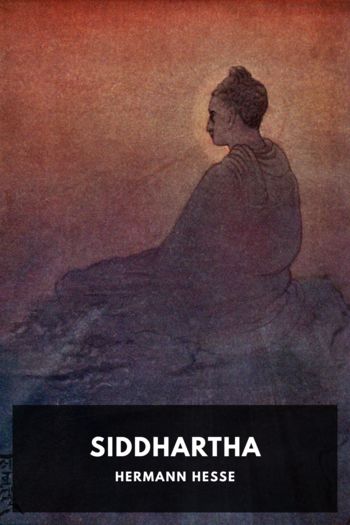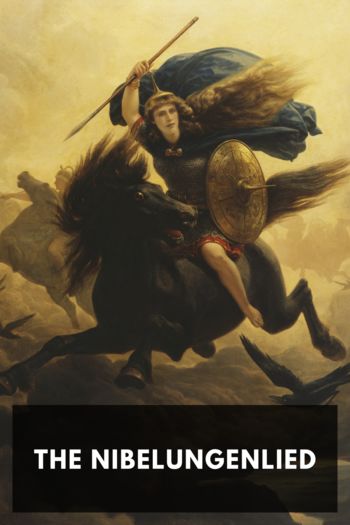Siddhartha, Hermann Hesse [free reads .TXT] 📗

- Author: Hermann Hesse
Book online «Siddhartha, Hermann Hesse [free reads .TXT] 📗». Author Hermann Hesse
“O Siddhartha,” he exclaimed, “will your father permit you to do that?”
Siddhartha looked over as if he was just waking up. Arrow-fast he read in Govinda’s soul, read the fear, read the submission.
“O Govinda,” he spoke quietly, “let’s not waste words. Tomorrow, at daybreak I will begin the life of the Samanas. Speak no more of it.”
Siddhartha entered the chamber, where his father was sitting on a mat of bast, and stepped behind his father and remained standing there, until his father felt that someone was standing behind him. Quoth the Brahmin: “Is that you, Siddhartha? Then say what you came to say.”
Quoth Siddhartha: “With your permission, my father. I came to tell you that it is my longing to leave your house tomorrow and go to the ascetics. My desire is to become a Samana. May my father not oppose this.”
The Brahmin fell silent, and remained silent for so long that the stars in the small window wandered and changed their relative positions, ere the silence was broken. Silent and motionless stood the son with his arms folded, silent and motionless sat the father on the mat, and the stars traced their paths in the sky. Then spoke the father: “Not proper it is for a Brahmin to speak harsh and angry words. But indignation is in my heart. I wish not to hear this request for a second time from your mouth.”
Slowly, the Brahmin rose; Siddhartha stood silently, his arms folded.
“What are you waiting for?” asked the father.
Quoth Siddhartha: “You know what.”
Indignant, the father left the chamber; indignant, he went to his bed and lay down.
After an hour, since no sleep had come over his eyes, the Brahmin stood up, paced to and fro, and left the house. Through the small window of the chamber he looked back inside, and there he saw Siddhartha standing, his arms folded, not moving from his spot. Pale shimmered his bright robe. With anxiety in his heart, the father returned to his bed.
After another hour, since no sleep had come over his eyes, the Brahmin stood up again, paced to and fro, walked out of the house and saw that the moon had risen. Through the window of the chamber he looked back inside; there stood Siddhartha, not moving from his spot, his arms folded, moonlight reflecting from his bare shins. With worry in his heart, the father went back to bed.
And he came back after an hour, he came back after two hours, looked through the small window, saw Siddhartha standing, in the moon light, by the light of the stars, in the darkness. And he came back hour after hour, silently, he looked into the chamber, saw him standing in the same place, filled his heart with anger, filled his heart with unrest, filled his heart with anguish, filled it with sadness.
And in the night’s last hour, before the day began, he returned, stepped into the room, saw the young man standing there, who seemed tall and like a stranger to him.
“Siddhartha,” he spoke, “what are you waiting for?”
“You know what.”
“Will you always stand that way and wait, until it becomes morning, noon, and evening?”
“I will stand and wait.”
“You will become tired, Siddhartha.”
“I will become tired.”
“You will fall asleep, Siddhartha.”
“I will not fall asleep.”
“You will die, Siddhartha.”
“I will die.”
“And would you rather die, than obey your father?”
“Siddhartha has always obeyed his father.”
“So will you abandon your plan?”
“Siddhartha will do what his father will tell him to do.”
The first light of day shone into the room. The Brahmin saw that Siddhartha was trembling softly in his knees. In Siddhartha’s face he saw no trembling, his eyes were fixed on a distant spot. Then his father realized that even now Siddhartha no longer dwelt with him in his home, that he had already left him.
The Father touched Siddhartha’s shoulder.
“You will,” he spoke, “go into the forest and be a Samana. When you’ll have found blissfulness in the forest, then come back and teach me to be blissful. If you’ll find disappointment, then return and let us once again make offerings to the gods together. Go now and kiss your mother, tell her where you are going to. But for me it is time to go to the river and to perform the first ablution.”
He took his hand from the shoulder of his son and went outside. Siddhartha wavered to the side, as he tried to walk. He put his limbs back under control, bowed to his father, and went to his mother to do as his father had said.
As he slowly left on stiff legs in the first light of day the still quiet town, a shadow rose near the last hut, who had crouched there, and joined the pilgrim—Govinda.
“You have come,” said Siddhartha and smiled.
“I have come,” said Govinda.
With the SamanasIn the evening of this day they caught up with the ascetics, the skinny Samanas, and offered them their companionship and—obedience. They were accepted.
Siddhartha gave his garments to a poor Brahmin in the street. He wore nothing more than the loincloth and the earth-coloured, unsown cloak. He ate only once a day, and never something cooked. He fasted for fifteen days. He fasted for twenty-eight days. The flesh waned from his thighs and cheeks. Feverish dreams flickered from his enlarged eyes, long nails grew slowly on his parched fingers and a dry, shaggy beard grew on his chin. His glance turned to ice when he encountered women; his mouth twitched with contempt when he walked through a city of nicely dressed people. He saw merchants trading, princes hunting, mourners wailing for their dead, whores offering themselves, physicians trying to help the sick, priests determining the most suitable





Comments (0)